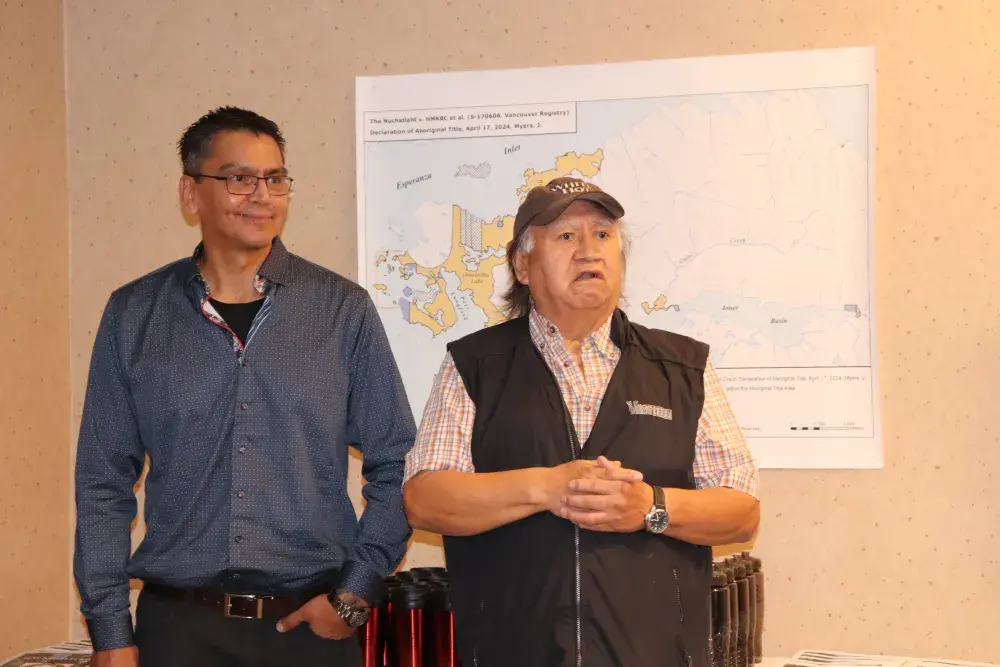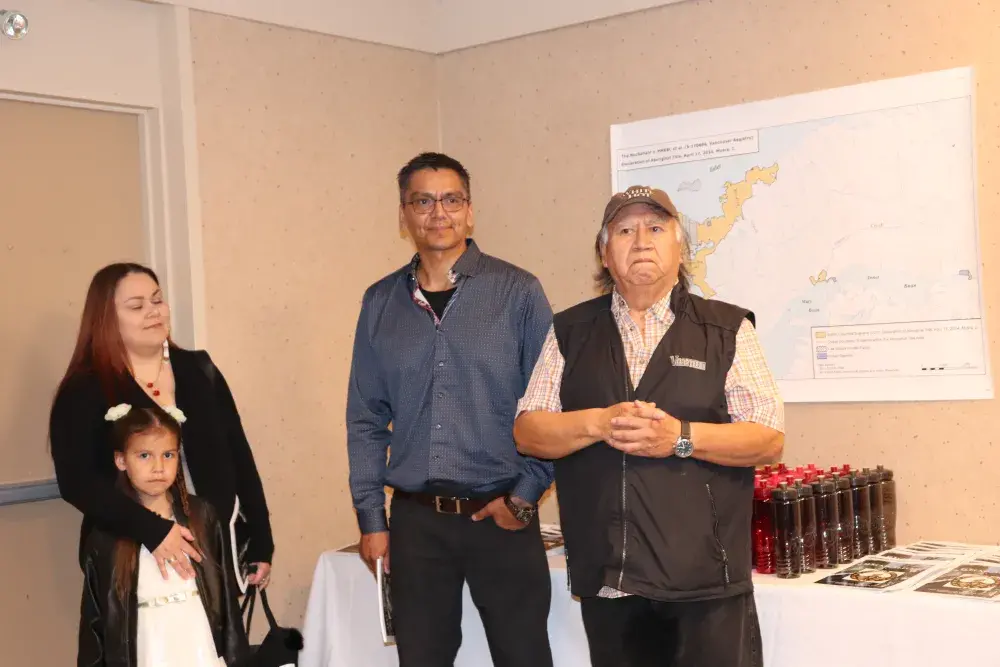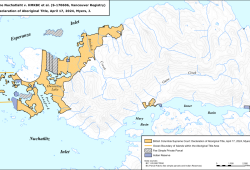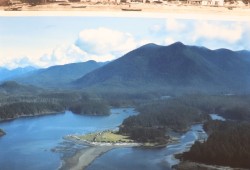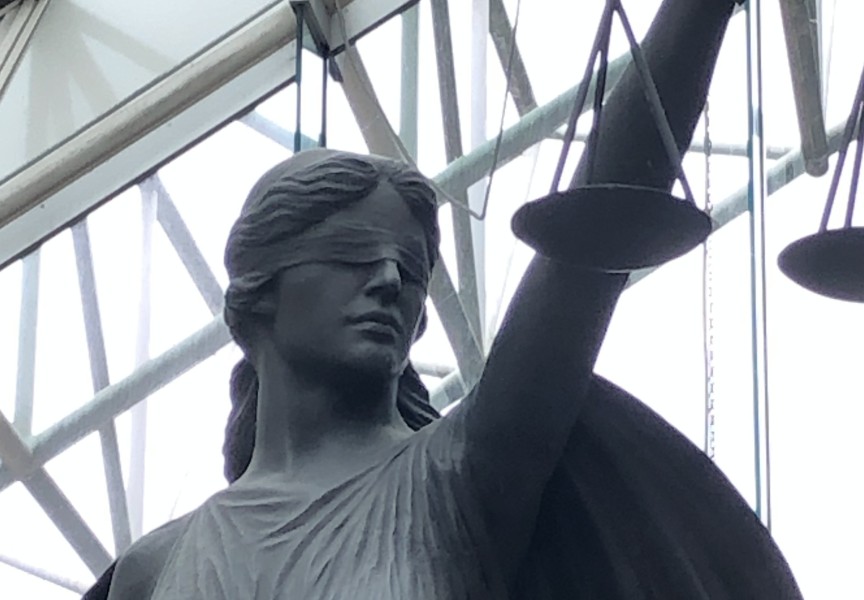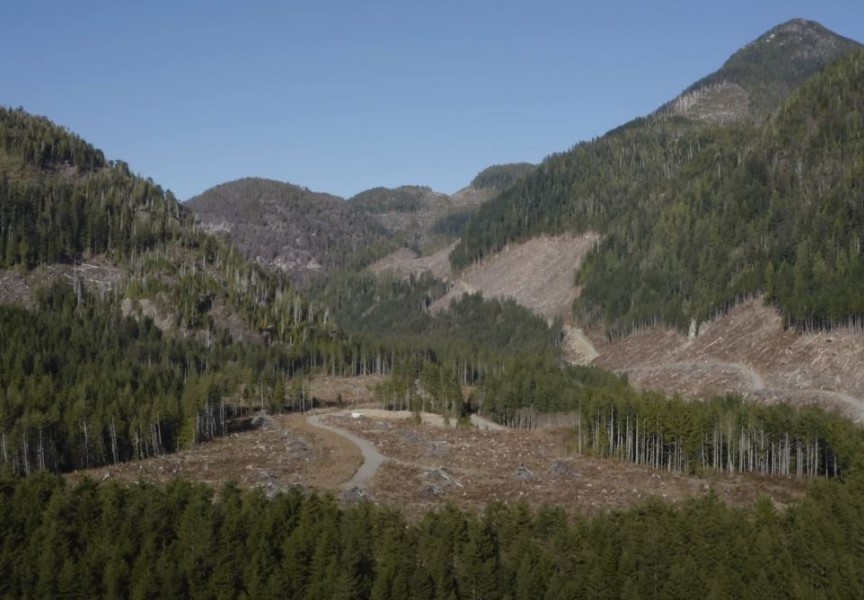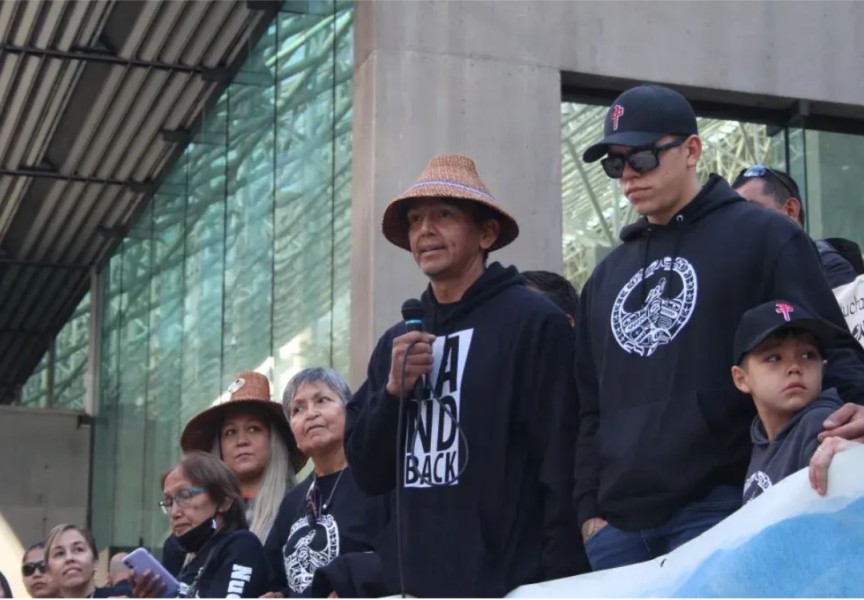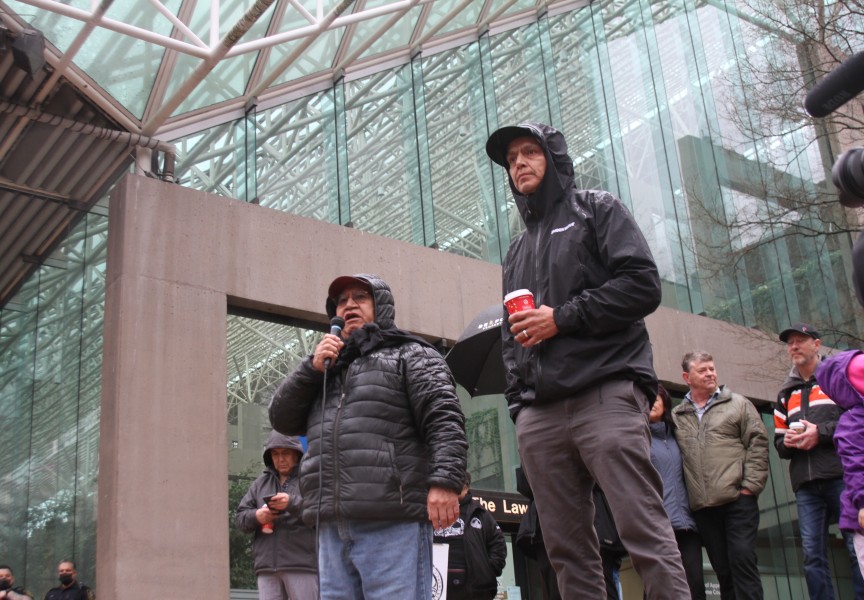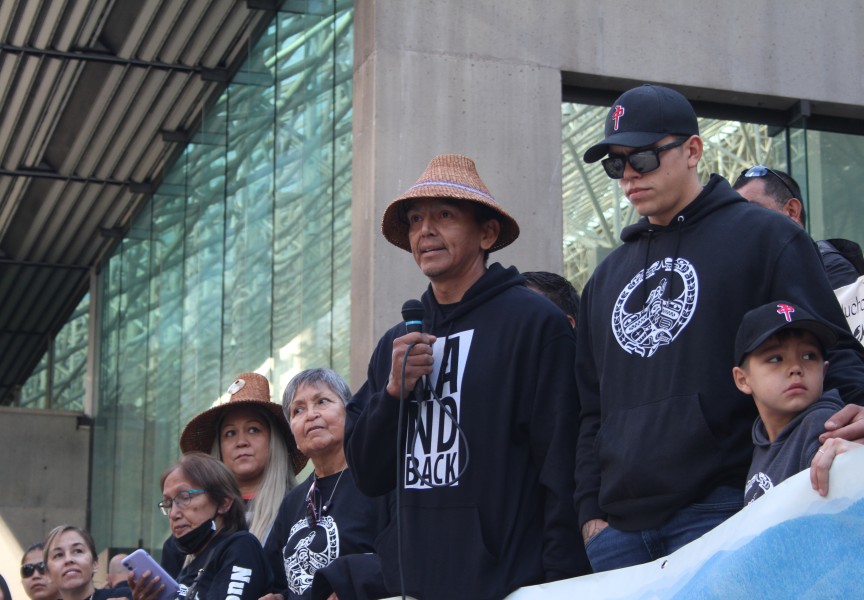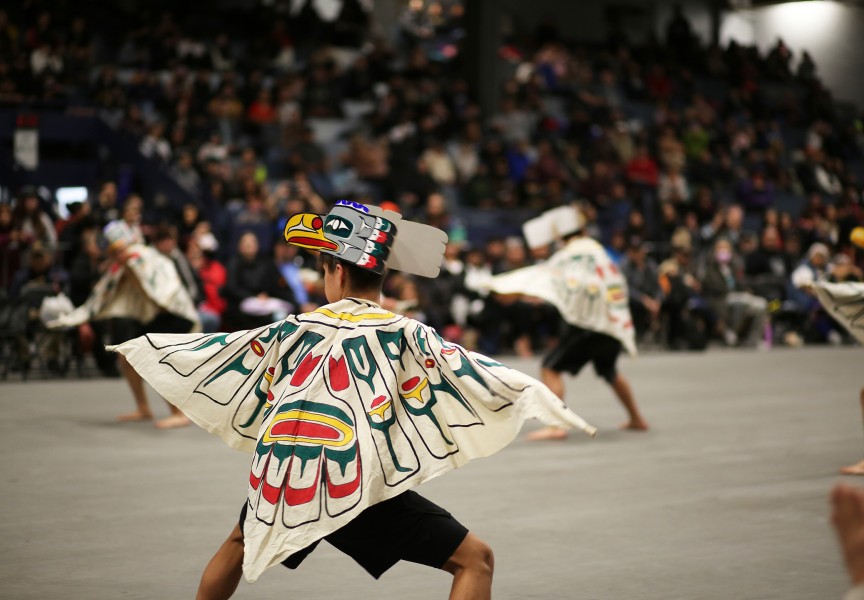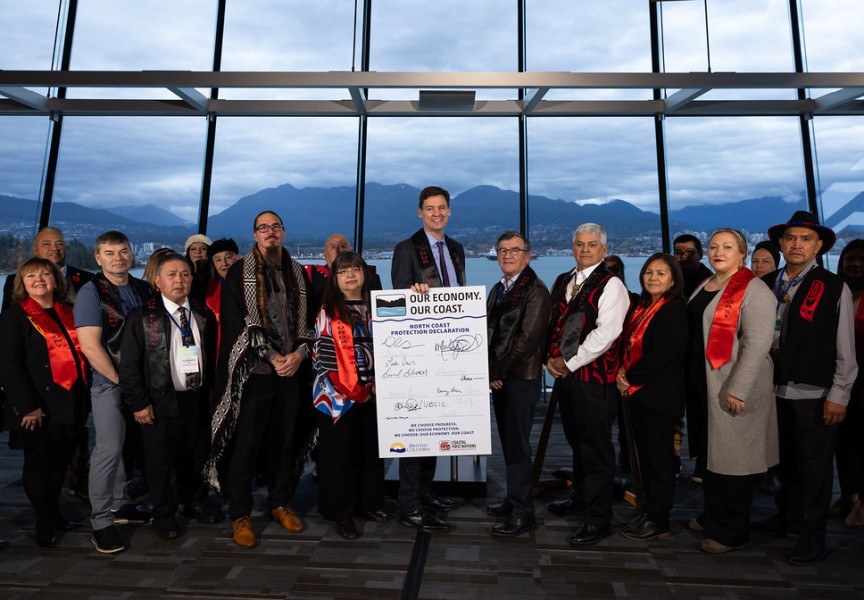Nuchatlaht Tyee Ha’wilth Jordan Michael and the legal team of E.J. Woodward Law Corporation hosted a victory celebration in Campbell River June 1 after their partial Aboriginal title court win last April. While it was a time for celebration, they acknowledged that the judge’s decision fell far short of their original land claim, vowing to appeal the decision to a higher court.
On April 17 Justice Elliott Myers released a judgement on the matter, which concerns the Nuchatlaht’s title claim to 201 square kilometres covering the northern part of Nootka Island. Myers determined that the First Nation proved Aboriginal title over a portion of this area, land that mostly entails a coastal strip along the northwestern edge of Nootka Island.
The strips of coastline the judge recognized as Nuchatlaht land amounts to 11.33 square kilometers, nearly 190 square kilometers short of Nuchatlaht’s original claim.
The judge said he found insufficient proof that the Nuchatlaht used inland areas of their northern Nootka Island claim. The Nuchatlaht lived on their reserve on Nootka Island until 1988, when drinking water issues forced a move to their present location at Oclucje.
Myers’ recent decision leaves the majority of the claim area as Crown land under B.C.’s Forestry Act. Currently Western Forest Products holds tenure of this area, although logging has ceased in recent years as the title case was fought in court.
There were information booklets called Tlecko Tlecko – a book of gratitude from Tyee Ha’wilth Jordan Michael and Jack Woodward given away at the celebration. In it, they wrote, it was in 1914 when Nuchatlaht Tyee Ha’wilth Felix Michael told the reserve commissioner he was sick of people from Vancouver coming up and taking Nuchatlaht land.
“110 years and Nuchatlaht are still here and they are still fighting,” stated the booklet.
Information from their gratitude booklet states it was late Tyee Ha’wilth Walter Michael Sr. that led the push to advance the court case.
“After years of frustration with the lack of respect Nuchatlaht received at the treaty negotiating table, he decided to bring the Nuchatlaht fight to the courts,” stated the document.
Nuchatlaht Councilor Archie Little grew up with late Tyee Ha’wilth Walter Michael. They attended residential school together and fished together. He continues to fight for what his friend and Ha’wilth wanted for the people.
Now they won the first-ever trial recognition of Aboriginal title from the Supreme Court of British Columbia. The 11.33 square kilometers of land that the BC Supreme Court declared on April 17 represents acres of lands, creeks and timber and reaffirms that the Nuchatlaht have the power to use and protect those lands and resources. The Nuchatlaht have proven that they are the historical and rightful owners of at least a portion of their claim area.
“We are the little nation of 170 people doing what we did,” said Little.
He recalled Tyee Ha’wiih (head chiefs) from the past, late Felix Michael, Walter Michael, and other Nuchatlaht elders that raised this generation and helped guide them.
“We’re a community. We look after each other and we’re going to get back to that,” said Little.
He said it was important to think of the future and what is leave grandchildren.
Archie Little, elected Nuchatlaht councilor. “The fight will continue until we get the full claim of northwest Nootka Island,” he vowed.
He thanked everyone that supported the First Nation in its long legal battle and for believing in the Nuchatlaht people. The Nuchatlaht, Little said, gave up a lot, because court battles are expensive. He thanked his people for being supportive.
Little told the crowd that Nuchatlaht was wealthy with herring and have beautiful territory.
“I’m looking forward to change – we’re going to get back to that and we’ve taken the first step,” he told the crowd.
The lawyers have been told to tell Nuchatlaht’s story and how proud they are as they govern themselves, he added.
The legal victory recognizes Nuchatlaht’s Aboriginal title to shoreline portions of their claim. What it means for the Nuchatlaht is their Ha’wiih (hereditary chiefs) will have full economic benefits from the 11.33 square kilometers on northwest Nootka Island.
Jordan Michael recalls walking to the courthouse with his father in 2017.
“It’s all just starting to sink in…it’s starting to feel like a victory even though it’s not all yellow,” he told the people, referencing the colored portions of Nuchatlaht title on a map. “It’s been stressful but I’m very happy with the way things are going and we’re not stopping.”
Lawyer Jack Woodward said he was pleased to say that news stories from Ha-Shilth-Sa archives made it into evidence presented to the judge.
“These are compelling stories of Nuu-chah-nulth life and culture,” he told Ha-Shilth-Sa.
Cherie Smith praised Woodward for his court successes, noting that the case will be taken to a higher court.
“We’re at the B.C. level, Jack always goes to the next level, and the next level,” she said.
Little said this court victory means they can rebuild a community at their Nootka Island home.
“We’re going to make it beautiful again,” said Little. “We’re going to fix it up and some of us are moving home.”
“It’s an historic day,” Woodward said, noting that this court win is the first declaration of Aboriginal title on Vancouver Island and in Nuu-chah-nulth territory.
It is the second in the province of British Columbia, after the 2014 Supreme Court of Canada’s Tsilqhot’in decision. The Tsilhqot’in gained Aboriginal title of 1,700 square kilometers of their land in central B.C. They were also represented by Woodward’s firm.
John Dewhirst, a cultural anthropologist, was thanked for his contributions as an expert witness. He also testified in the Meares Island and Tsilhqot’in cases.
Historical evidence of agriculture
During preparation for trial, important discoveries were made that support Nuchatlaht’s Aboriginal title claim. For example, Jacob Earnshaw, archaeologist and anthropologist, discovered an error in the way culturally modified trees were counted. Corrections in the counting method increased the number of CMTs mapped in Nuchatlaht territory by nearly 50 per cent.
Archaeologist and anthropologist Chelsea Armstrong proved that the Nuchatlaht cultivated numerous plant foods and medicines in their territory, dispelling the myth that First Nations people were simply hunters and gatherers in the precontact era.
“Chelsea discovered evidence of agriculture in Nuchatlaht territory,” said Woodward.
At last count researchers found 17 different species of food plants grown by the Nuchatlaht near their village sites. They planted things like crab apple trees and rice root near the villages to feed their people.
For now, the nation looks forward to having full economic benefits that come with recognized Aboriginal title along the northwest shoreline of Nootka Island.
Ethan Krindale, a lawyer with E.J. Woodward Law Corporation, clarified that “an appeal hasn’t been filed because the order hasn’t been made, yet.”
“Once that happens, the paperwork will be filed,” she said of appealing to a higher court for the full 201-square-kilometre claim.
“This is Nuchatlaht’s victory, but the path being laid is for others to follow,” wrote the Woodward legal team with Ha’wilth Michael. “Nuchatlaht has won something, surrendered nothing for it and are still fighting for the rest. They have achieved this faster than any other First Nation.”

